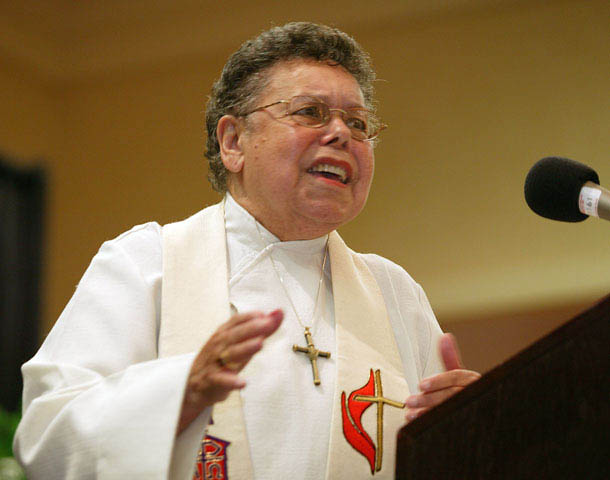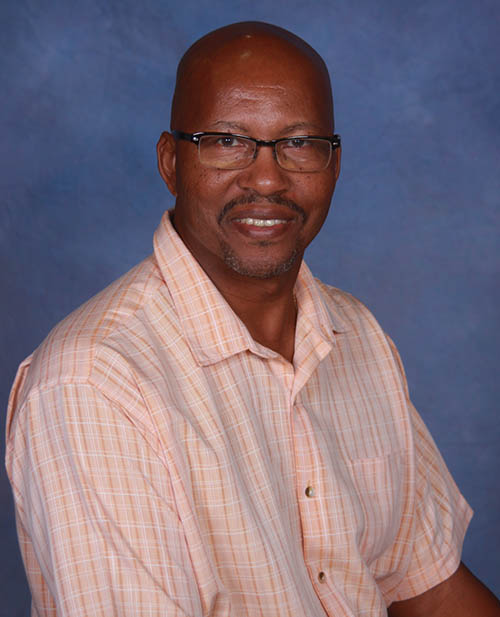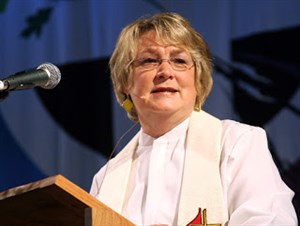Bishop Kelly was featured in a conference ‘Bright Spot’ video. View here…
By Madeline Pillow White

Bishop Leontine Turpeau Current Kelly is a figure who remains revered and loved by many in the Virginia Conference and around the global denomination even nine years after her passing.
She began her ministry in her early 50s and became an elder in the Virginia Conference. She would go on to be elected bishop in the Western Jurisdiction in 1984 and, by doing so, became only the second female bishop in the history of the denomination and the first African-American female bishop of any major denomination in the world.
Her trailblazing and historic election would leave in her wake more opportunities for clergywomen as well as a path of hope and encouragement for all from which to draw.
Early beginnings
The Rev. Kevin Elmore, pastor of Andrew Chapel UMC in the Rappahannock River District, grew up at Galilee UMC in Edwardsville where then Rev. Leontine Kelly was the pastor in the late 1960s to mid-1970s.
At the time, Elmore was in his early teens, the same age as Kelly’s children. He has fond memories of spending time outside her parsonage after church and of Kelly playing Jacks with the children.
“She made church different than most of the pastors we had had in the past,” Elmore said.
Kelly was the first female pastor the little community church of 120 members had. And even after she left Galilee, Kelly would return to preach for revivals and was instrumental in some church building projects including the parsonage.
Elmore said he remembers Kelly as kind and passionate and a natural storyteller in her preaching.

“Her style was charismatic, but more like storytelling and helping you relate to what was happening.”
He also distinctly remembers that she was a “hand-talker” when preaching. Often during preaching, Elmore shared, Kelly would bring up her index finger to rest just under her lips as if preparing herself and the audience for her next point.
For Elmore, Kelly had impact wherever she went and sees her influence in where he is today. He remembers that she was instrumental in making sure he and his siblings went to college.
“She was about people and making sure, especially people of color, making sure they got to the place where she believed they could get. [She was] always lifting people up,” Elmore said.
Ministry journey
Kelly’s daughter, Angella Current-Felder, reflected that her mother taught her children that looks were not important, but instead, character and what was inside was very important.
Though her children when already grown when Kelly was elected to the episcopacy Current-Felder and her siblings fully supported their mother’s ministry and saw it as a testimony of how God can use anyone at any time of their life.
For Current-Felder, her mother’s election was also a God-ordained moment. She got on a plane to Idaho after her mother called and told her not to travel to Lake Junaluska; that she was now in consideration for bishop at the Western Jurisdictional Conference. Upon arriving, Current-Felder found out about the historic election. A gentleman outside was reflecting with her about how the events were his first encounter with the Holy Spirit. Present with her mother for the consecration, Current-Felder said her mother was both surprised and humbled, but that Kelly very much believed that what God wanted to happen would happen.
Current-Felder acknowledged that though her mother by Discipline could only serve four years as an episcopal leader, Kelly lived to 94 years old and traveled all over the nation and world after retirement, including Africa and Japan, to preach.

“She was highly respected and recognized for her gifts, her preaching skills, but also her ability to challenge systems, to speak to truth to power as we say, to share that in a way that people regardless of race and/or their social economic background could relate to that,” Current-Felder said.
As to her effect for those who follow in her footsteps, her daughter focuses on hope.
“She modeled that women can do great things. Even if you grow up being told that you cannot there’s always somebody in your life who affirms you and inspires you, so that you are able to utilize the gifts that God has given you to help others,” Current-Felder said. “It’s not just about your own development but how do you utilize those skills and those gifts to empower and enhance others persons and that what she modeled.”

Historic election
Bishop Charlene Kammerer was the first woman elected in the Southeastern Jurisdiction in 1996. For her, she continues to carry rich and warm memories of Bishop Leontine Kelly especially as a person who means so much especially to clergywomen and women bishops.
“She continues to be a source of light and courage for me. Those of us who came after her in this role in the United Methodist Church called her our mother bishop,” Kammerer said.
Kammerer shared that Kelly’s name is still shared and talked about across the church, the global church, as well as within “the sweet sisterhood of women bishops in the United Methodist Church.”
“We remember her smile, we remember things that she said in her sermons, we remember her stepping out of that pulpit and going up and down the aisles to preach even in the Council of Bishops, we remember her signal leadership and the founding of African University, and we remember her journey, her trailblazing journey, that made it possible for women to follow her not only in the U.S. but indeed across the world.” Kammerer said.
Kelly was a candidate for the episcopacy but was not endorsed from the Virginia Conference where she was an elder in full connection and highly respected.
Her endorsement rather came through a jurisdictional effort by both clergy and lay women.
Kammerer was on the clergy election team that directed her campaign. Campaigns in the denomination are not like your typical political campaigns. In The United Methodist Church, a campaign means giving a candidate opportunities to preach, to have individuals speak on their behalf from personal experience and sharing about them around the jurisdiction.
At the 1984 Southeastern Jurisdictional Conference, Kammerer said she was a young clergyperson from Florida, and it was clear after two days of voting that Kelly would not get enough votes to be elected in the jurisdiction.
At that point, the Western Jurisdiction, all jurisdictions meet at the same time, asked Kelly to come over to interview and meet their different delegations.
The night before she left, Kelly met with her clergy election team in the chapel at Lake Junaluska for a time of prayer and sending forth.
“We believed this was a God-spirited thing,” Kammerer said.
She remembered that the money for Kelly’s ticket to Boise, Idaho was raised amongst the clergywomen which at that time was difficult because there was no direct flight.
Kammerer shared that as a young clergywoman on a minimum salary, she did not have many resources, but she was so convicted to do her part that she wrote a check that she knew would bounce. She called her husband and shared that she was not apologizing but would need him to make a deposit in their account to make sure Kelly could get there.
This memory has stayed with her a long time.
“It was the only time I have bounced a check in my life, but it was for a good cause,” Kammerer said with a laugh.
Lasting influence
Kelly was presiding the chair in 1988 when The United Methodist Church adopted the initiative for Africa University, and she became a founding member of the board.
When Kammerer was assigned to the Virginia Conference in 2004, she shared that clergywomen shared a number of stories about Kelly who was a figure who continued to inspire and encourage them.
“She had a unique gift of connecting with people, of praying with them and encouraging them,” Kammerer said. “She was a mediator, a peacemaker in her ways of doing ministry. I often heard of her that she ‘loved’ people to a better place when they would disagree.”
Kammerer also reflected that it is rare even now at a clergywomen’s gathering in Virginia or around the jurisdiction not to hear Bishop Kelly’s name lifted in prayer and as a prayer of gratitude.
Lasting influence for clergywomen
Kammerer shared that it was a very difficult and painful time in the jurisdiction in 2003 for clergywomen because there had been called and gifted women but no more women had been elected to the episcopacy for two quadrennium.
At an SEJ clergywomen event in 2003, Kelly was invited to preach alongside Kammerer for the event under the theme of “Guide our Feet.”
At the conclusion of Kammerer’s sermon, she arranged to have a running baton that is used in track and invited Kelly on stage. Kelly took the baton and handed it to Kammerer and Kammerer, in turn, extended it beyond her reach as a sign of who would come behind her.
“We believed it was time and that God was opening that door for our jurisdiction,” Kammerer said.
Less than a year later at the 2004 SEJ, Hope Morgan Ward and Mary Elizabeth Taylor were both elected. This came about, Kammerer reflected, because of the work and witness of many clergy and lay women who made it happen as well as what Kammerer views the presence of Kelly and how she represented hope.
“I loved this woman and appreciated her so much,” Kammerer said. “It is an honor to speak about her.”
To learn more about Bishop Kelly, The United Methodist Church shared a two-part series about the Black women pioneers in U.S. Methodism where Bishop Kelly is featured: https://www.umc.org/en/content/ask-the-umc-black-women-pioneers-part-2?fbclid=IwAR3wG7Mc3is3-ARmlOlG6H-uJUQ1slULApuzYDl394BYh0LYHed4J6_SxTk.
Book Resources:
- Breaking Barriers by Angella Current-Felder https://www.abingdonpress.com/product/9780687070367
- The Leading Women: Stories of the First Women Bishops of the United Methodist Church by Judith Craig https://www.amazon.com/Leading-Women-Stories-Bishops-Methodist/dp/0687088380
Madeline Pillow White is the conference Director of Communications.
